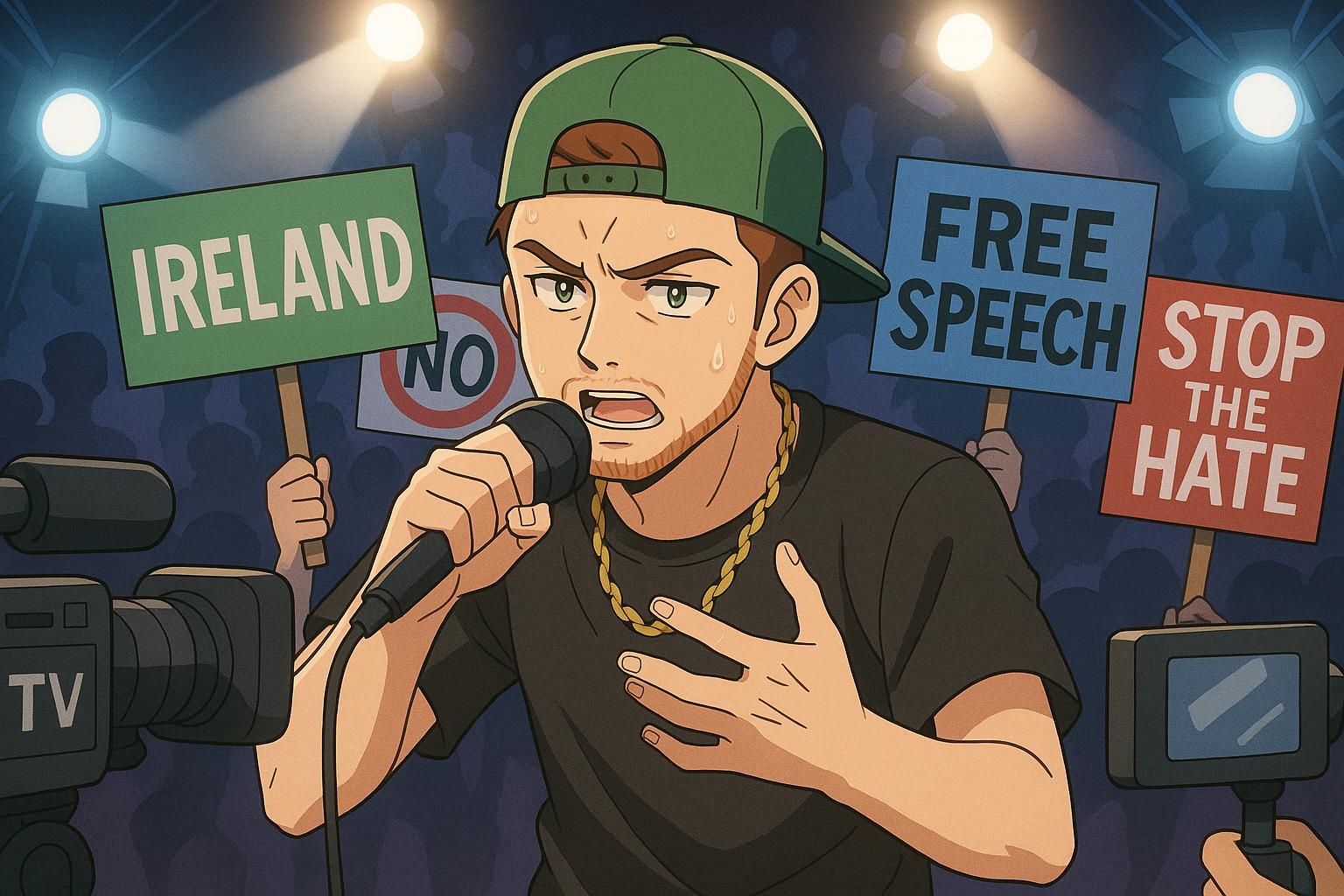The Irish hip-hop group Kneecap has found itself at the centre of a political storm following controversial comments made during performances that have led to calls for their removal from the upcoming TRNSMT festival in Glasgow. Their recent gigs have drawn attention, particularly a clip from a 2023 performance where one member reportedly stated, "The only good Tory is a dead Tory. Kill your local MP," sparking condemnation from politicians and igniting a fierce debate around free speech and artistic expression.
This controversy erupted after Kneecap performed at the Coachella music festival, where they made pro-Palestinian statements, including claims that "Israel is committing genocide against the Palestinian people." The backlash intensified when footage surfaced not only of the aforementioned remarks but also of earlier comments expressing support for groups banned in the UK, which has increased scrutiny from law enforcement. The Metropolitan Police have confirmed an investigation led by its Counter Terrorism Command, reflecting the serious nature of the allegations against the group, which has previously combined satirical commentary with themes from Irish republicanism in their music.
First Minister John Swinney has publicly denounced the band's comments, calling them "completely and utterly unacceptable" and indicating that they undermine valuable debate about free speech. He suggests that these statements have crossed a line that makes their participation in the festival difficult. This sentiment echoes broader concerns surrounding public safety and political rhetoric, especially in the context of the UK, where the assassinations of MPs Jo Cox and David Amess have underscored the potential real-world consequences of inflammatory language.
In contrast, some local politicians, including Scottish Green councillor Jon Molyneux, have defended Kneecap, framing the backlash as a deliberate effort to silence opposition. Molyneux's motion at a recent Glasgow City Council meeting condemned the Israeli government while acknowledging the backlash against the band as part of a broader trend to suppress dissenting voices. He insists that while the band's statements were misguided, this should not equate to a call for censorship, particularly in light of their outspoken support for Palestinian rights and their artistic expression.
SNP leader Susan Aitken expressed sympathy for those upset by Kneecap's remarks, stating that while accountability is necessary, this should not lead to a ban on their performance. She argued that freedom of expression extends to all artists, even those whose work may provoke discomfort. Aitken articulated a belief that art's role often involves challenging prevailing narratives and stimulating dialogue, a sentiment echoed by prominent musicians who have supported Kneecap amidst the backlash.
However, opposition parties, including Labour, have raised alarms about equating provocative statements with artistic expression. They argue that calls to violence, irrespective of artistic intent, cannot be dismissed as mere satire. Councillor Bill Butler pointed to the seriousness of implying violence against politicians, warning that such rhetoric diverges from the realm of acceptable debate. This highlights a significant divide in how political speech is interpreted and regulated within the current climate, with implications for artistic freedoms and societal norms surrounding speech.
As the debate continues, Kneecap has maintained that their comments were taken out of context and have issued apologies to the families of the murdered MPs, asserting that their intent has always been one of empowerment and solidarity. They have described the reaction as part of a "coordinated smear campaign," alleging that their criticisms of the Israeli government have played a role in the backlash they are facing. Kneecap's position accentuates the complex intersection of art, politics, and societal responsibility, posing challenging questions about where freedom of expression ends and the call for accountability begins.
The future of Kneecap at the TRNSMT festival hangs in the balance, as festival organisers and political leaders navigate the ramifications of their provocations. As the conversation evolves, it is evident that issues surrounding artistic freedom and responsibility will remain at the forefront of public discourse, reflecting deep-rooted tensions within contemporary social and political landscapes.
Reference Map:
Paragraph 1: (1), (2), (4)
Paragraph 2: (2), (4), (5)
Paragraph 3: (1), (3), (4)
Paragraph 4: (1), (3), (4)
Paragraph 5: (4), (5)
Paragraph 6: (1), (2), (4)
Paragraph 7: (3), (4)
Source: Noah Wire Services
